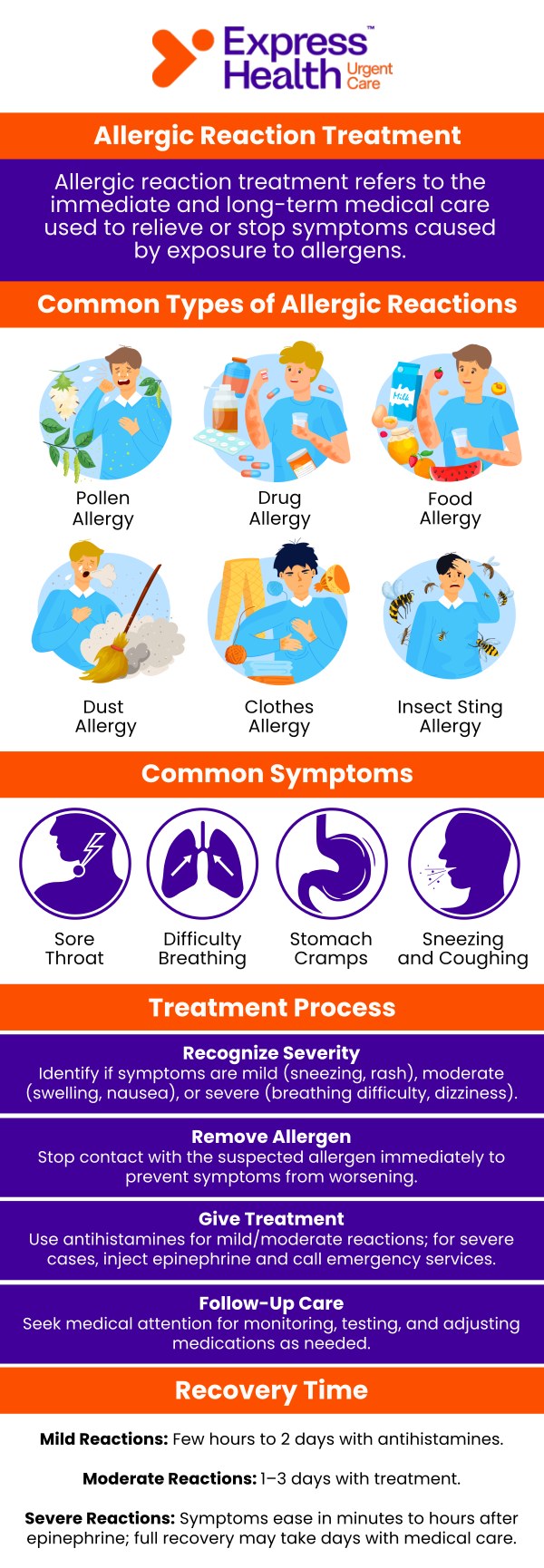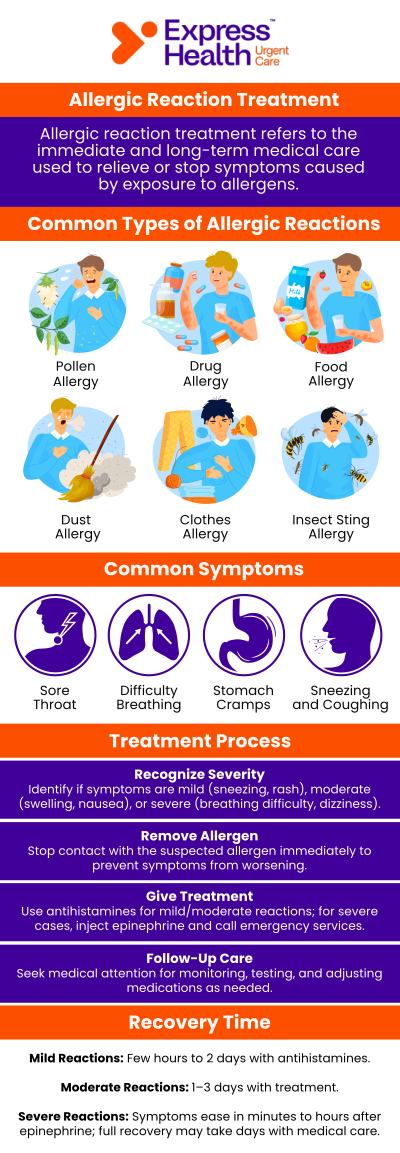Allergic Reactions Treatment Clinic in NYC
Our doctors at Express Health Urgent Care offer comprehensive treatment for allergic reactions and allergy treatments. Some common symptoms of an allergic reaction and allergy include itchy and watery eyes, runny nose, sneezing, rashes, hives, swelling, and vomiting. For more information, contact us today or book online to schedule an appointment – we’re happy to get the process started for you as soon as possible. We have convenient locations in East Harlem, NY, Metropolitan, NY, and Staten Island, NY.




Table of Contents:
What are the types of allergic reactions?
What are the ways to treat an allergic reaction/allergy symptoms?
How long does it take for an allergic reaction to go away?
When should you go to the hospital for an allergic reaction?
Allergic reactions and allergy symptoms happen when the body’s immune system reacts to a substance and sees it as harmful, like pollen, bee stings, specific foods, and other things that do not cause a reaction in most people.
The immune system produces substances that are called antibodies. When you have allergies, the immune system makes antibodies to protect the body from things that aren’t harmful to most people. When you encounter an allergen, your immune system’s response can inflame your sinuses, skin, airways, or digestive system. Allergies can range from mild to severe, even life-threatening. Most allergies cannot be cured, but symptoms can often be treated.
Allergic reactions get classified into four different types based on their reactions.
1. Immediate – symptoms appear almost immediately, within seconds to minutes. They can be anaphylactic, the most severe form of reaction, and they can be deadly. Symptoms include low blood pressure, difficulty breathing, bluish skin, and shock.
2. Cytotoxic – symptoms take minutes to hours to appear.
3. Immune complex-mediated symptoms set in after a few hours.
4. Delayed hypersensitivity – symptoms may take days to appear.
It is helpful to recognize the symptoms of an allergic reaction, these include, rash, itching, hives (large pink bumps or swollen areas), swelling in the mouth or throat, sneezing and watery eyes, and rapid or difficulty breathing.
If you encounter someone who is having difficulty breathing because of an allergic reaction, call 911 immediately. The person may have an EpiPen on them because of their allergy. This will be injected into a muscle, usually in the leg.
In the case of skin reactions, wash the affected area with lukewarm water and mild soap. Apply hydrocortisone cream or other lotion like calamine lotion. If the rash is severe or doesn’t go away or you see signs of infection, call a doctor.
If the reaction is hives, know they will subside. To alleviate the symptoms, avoid hot showers and baths, apply a cool compress, wear loose and comfortable clothing, and sleep in a cool room.
For itching, sneezing, and watery eyes, an antihistamine is the best.
Allergic reactions last for varying lengths of time. They can take a few hours or a few days to disappear. If the exposure to the trigger allergen continues, the reaction will last as long as the exposure remains and can last for longer periods. This is the case with allergies to pollen. Some allergic reactions are stubborn and can take two to four weeks to go away.
If you are having an allergic reaction or encounter someone who is having an allergic reaction, look for the following signs as they may require immediate medical attention:
● Abdominal pain can include vomiting, intense nausea, or diarrhea.
● Chest tightness
● Light-headedness
● Swelling of the eyes, tongue, mouth, or throat
● Skin reactions or discoloration of the skin
● Tingling hands, feet, mouth, or scalp
● If they have a rapid pulse or weak pulse
The most severe allergic reaction, anaphylaxis, requires an immediate response. Anaphylaxis occurs when the body releases too many antibodies. Left untreated, anaphylaxis can become anaphylactic shock (a narrowing of the airways and sudden drop in blood pressure), cardiac arrhythmia, seizures, and even death.
Express Health Urgent Care provides a wide range of services and can help with allergic reactions and allergy treatments. If you feel that you are having an anaphylactic reaction, call 911. If the reaction is less severe, we can help. We have walk-in services available; no appointment is needed. Contact us today for more information or book with us online if you’d like to schedule an appointment. We have convenient locations in East Harlem, NY, Metropolitan, NY, and Staten Island, NY. We serve patients from East Harlem, Manhattan, Brooklyn, Williamsburg, Greenpoint, Staten Island, Rossville, Tottenville, the Metropolitan New York City area, and surrounding neighborhoods, NY.


Additional Services You May Need
▸ Broken Bone and Fractures
▸ Chronic Disease Management
▸ COVID-19 Testing
▸ DMV Vision Tests
▸ Drug Testing/Screening
▸ EKG Services
▸ Illness and Injuries
▸ IV Fluids/Medications
▸ On-Site Lab + X-Ray
▸ STD Testing
▸ Stitches
▸ UTI Treatments
▸ Urgent Care
▸ Splinting
▸ Abdominal Pain
▸ Flu Test
▸ Sore Throat
▸ Blood Work
▸ Flu Vaccines
▸ Urine Test
▸ Pediatrics Services
▸ Adult Treatments



